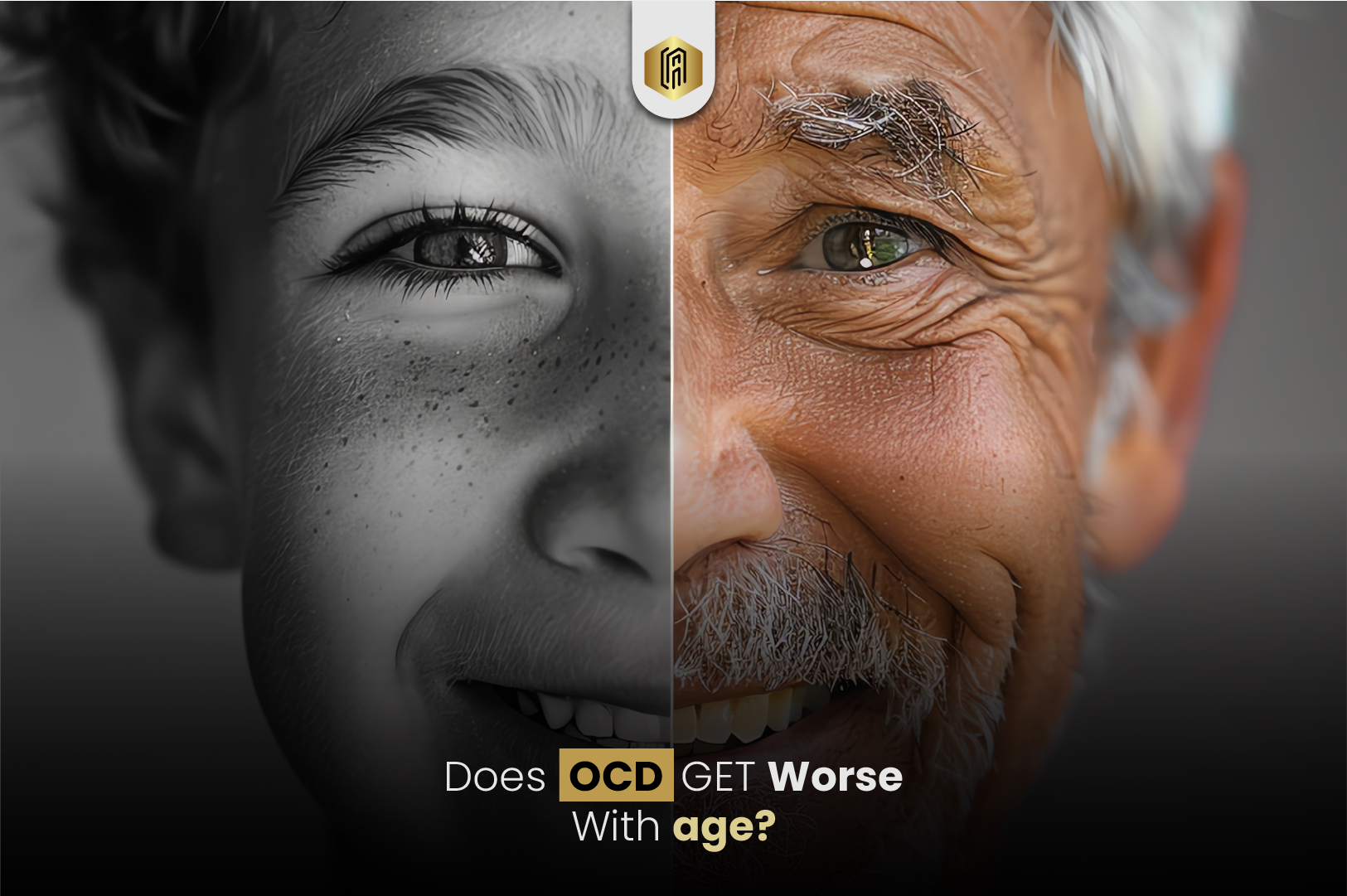OCD, short for Obsessive-Compulsive Disorder, impacts 2 to 3% of people around the world. It’s about relentless, distressing thoughts these are obsessions.
It’s also about repeated behaviors, which we call compulsions. No one is exempt, and its power affects daily life.
So, does OCD get worse with age? Let’s dive into this problem and try to get a deeper understanding.
If you’re in Atlanta, GA, or Washington, DC, and have OCD, we’re here to help. Our skilled psychiatrist offers support and personalized care. Book an appointment with the Ascension Psychiatric Services team today.
What Is OCD?
Before exploring “Does OCD get worse with age?”, it’s essential to understand OCD.
OCD is a condition that affects people of every age. The strength of its signs and symptoms fluctuates greatly. For a few, it manifests as subtle, handleable signs. Others, however, grapple with disruptive obsessions and compulsions.
The obsessions in OCD, causing huge worry and unease, show up as invading thoughts, pictures, or intense needs. These can include:
- Fears of contamination
- Worries about harming others
- Doubts about whether certain actions were completed (e.g., locking the door)
Compulsions are the behaviors or mental acts performed to neutralize the anxiety caused by obsessions. These might include:
- Excessive hand-washing
- Checking
- Counting
- Repeating actions
Does Trauma Trigger OCD?
Yes, trauma can sometimes spark OCD in people. Unsettling events, whether seen or felt firsthand, can heighten or start OCD symptoms.
The severe stress and emotional turmoil caused by trauma might crank up a person’s susceptibility to OCD.
However, trauma isn’t the only catalyst, it’s a key risk element, especially when genetics or surroundings come into play.
Why Is My OCD Worse at Night?
Those suffering from OCD often notice increased symptoms during the evening. “Why is my OCD worse at night?” is common. Here’s why your OCD symptoms may ramp up when nighttime comes:
- Quiet Environment: The calm and quiet of nighttime can amplify intrusive thoughts and anxiety, as there are fewer distractions.
- Darkness: The darkness can heighten focus on compulsive behaviors, making them harder to avoid.
- Fatigue: Tiredness impairs your ability to manage symptoms effectively, allowing OCD to take hold more easily.
- Diminished Cognitive Resources: Fatigue affects cognitive functions like decision-making and emotional regulation, worsening symptoms.
Understanding these factors can help you develop strategies to manage OCD symptoms more effectively during nighttime.
What Makes OCD Worse?
Many elements can make OCD signs more intense over time. These are:
- Ignored Symptoms: Not dealing with OCD signs can make them worse.
- Rising Stress: Big life events and stress might increase symptoms.
- Additional Mental Health Problems: Other mental health issues may cause challenges in handling OCD.
- Aging-Related Cognitive Changes: Changes in cognitive function with age may affect OCD symptoms.
Does OCD Get Worse with Age?
The relationship between aging and OCD is complex. Some studies suggest OCD might get tougher as we age, especially when it’s ignored.
Always being anxious and stuck in your thoughts can add fuel to the fire. On top of that, fresh sources of worry, like health concerns or grieving, can spark OCD signs.
On the flip side, some people might find their OCD easing up with time because they are less anxious, manage problems better, or get effective help.
Shifting one’s attention from obsessions may also help lighten OCD symptoms.
Factors Influencing Symptom Progression
- Taking Treatment Seriously: To reduce symptoms, it’s really important to stick with treatments, particularly ones like CBT with ERP.
- Amount of Stress: Having a lot of changes in your life and stress can make symptoms worse.
- Co-occurring Conditions: Addressing other mental health issues is vital for effective OCD management.
- Cognitive Changes: Aging-related cognitive issues may impact OCD, potentially leading to more rigid thinking or difficulty with compulsions.
- Social Support: A strong support network can improve coping and symptom management.
Does Alcohol Make OCD Worse?
Drinking can intensify OCD signs. Some may find relief in alcohol to soothe worry, yet this often results in heightened compulsive and obsessive behavior.
Alcohol disrupts the brain’s signals, worsening OCD and weakening control. It affects our sleep patterns and overall mental health too.
If you’re dealing with OCD, it’s crucial to avoid alcohol and seek expert advice.
Treatment Options for OCD
It’s vital to treat OCD properly to control it and keep symptoms from getting worse. The top treatments for OCD that research supports include:
Therapy
The top respected treatment for OCD is Cognitive Behavioral Therapy. There’s a special kind, called Exposure and Response Prevention (ERP). In this, you slowly face your obsessions and stop yourself from certain tendencies. This method lowers the stress tied to obsessions and lessens the need to do rituals.
Medication
Selective serotonin reuptake inhibitors (SSRIs) are commonly prescribed for OCD. These meds can reduce the intensity of obsessions and compulsions. They do this by improving serotonin levels in the brain.
-
Other Medicine Options
In some cases, other types of medications may be prescribed if SSRIs are not effective. These medications can include:
- Antidepressants
- Anti-anxiety medications
- Mood stabilizers
Choosing the correct way to handle OCD matters a lot.
Mindfulness Exercises and Relaxation Methods
Mindfulness exercises and relaxation methods can be great companions to typical treatments. They help individuals manage stress and anxiety more effectively. Here are some effective techniques:
- Deep Breathing
- Progressive Muscle Relaxation
- Meditation
These techniques can reduce the overall stress that may trigger OCD symptoms.
Lifestyle Changes
Making certain lifestyle changes can have a positive impact on managing OCD symptoms. These changes might include:
- Regular physical exercise
- A balanced diet
- Adequate sleep
- Reducing the intake of caffeine
- Reducing the intake of alcohol
These adjustments can help reduce anxiety and improve overall well-being.
Conclusion
To sum up, does OCD get worse with age? OCD is a long-lasting condition. Its severity varies among individuals and doesn’t always increase with age.
Factors like treatment, stress, other health issues, and mental well-being influence symptom changes. With the right support, many manage their OCD well and may improve with age.
For older adults, managing OCD requires:
- Early treatment
- Following care plans
- Healthy habits
FAQs
Can OCD go away with age?
OCD usually doesn’t disappear with age. Most individuals need ongoing treatment, although symptoms might change over time.
Can OCD cause panic attacks?
Yes, the extreme worry tied to OCD often leads to panic attacks. Managing both OCD and panic attacks concurrently is essential.
Does therapy make things worse before they get better?
At times, when facing our fears in therapy, things might seem to get a bit harder. However, persistence usually leads to significant improvements.
Is OCD debilitating?
Yes, OCD can be debilitating. It often makes daily activities challenging due to persistent unwanted thoughts and compulsions, impacting focus and quality of life.
Does OCD cause headaches?
OCD might indirectly lead to headaches because of severe stress and anxiety. Constant mental pressure from obsessions and compulsions might result in tension headaches.





No comment